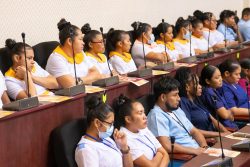Dear Editor,
I commend Mr. Aslam Hanief for his brilliant letter “Alternative methods of punishment have to be taught and can’t be introduced overnight”, (SN December 31, 2006). That he has never used corporal punishment on his students is extraordinarily commendable, and I know that he never will. I wish there were more teachers of Mr. Hanief’s calibre in the school system. The classroom management and disciplinary measures outlined in his letter serve as a useful refresher for trained teachers and would be found helpful by untrained teachers.
But what is odd is his contention that corporal punishment should not be immediately abolished because teachers lack knowledge of the alternatives to corporal punishment. This I cannot understand. I can clearly recollect that when I underwent in-service training at the CPCE Rose Hall Centre from 1995-1998 we had lectures on corporal punishment and its alternatives. In fact, in my old methodology lecture notes of December 5, 1995, under classroom management and discipline, are listed eleven methods of preventing indiscipline and fifteen corrective methods of dealing with indiscipline when it does occur, as well as a note in red ink: “Do not use corporal punishment, ever.”
In psychology, we discussed the use of corporal punishment as a negative reinforcer and its ineffectiveness as a behaviour modifier. We learnt that reward is more effective in modifying behaviour than is punishment. Moreover, Regulation 94 (Laws of Guyana, Cap 39:01, Education Code Regulations) governing the use of school corporal punishment was drilled into us by the Head-of-Centre. The training we received was of a superb quality. How well we ‘duck-backs’ absorbed it is another matter.
The fact is that all teachers who passed through CPCE at Turkeyen and its outlying branches within the last decade would have definitely done classroom management and, logically, should have covered alternatives to corporal punishment. With at least 300 teachers graduating from CPCE every year for the past ten years, there should be at least 3,000 teachers in the system equipped with the knowledge and skill in using the alternatives to corporal punishment. That’s about half the total number of teachers, not counting the older more mature ones who were trained earlier at CPCE or at UG. (Don’t use teacher migration as an excuse – that’s another can of worms.)
Alternatives have to be taught and can’t be introduced overnight? No facilities and necessary institutions to handle a complete ban of CP? Teachers not acquainted with the revolutionary mode of discipline? We are not yet ready for an immediate ban of school CP? Ha! We have been so ready and ripe for the past ten years that we are now in danger of becoming overripe and rotten, and might have to start all over again. (I have just heard on the NCN morning news that Region Six will be getting four more school welfare officers for the new academic term.) What is lacking is not knowledge of the alternatives but the conviction and commitment to use them.
Mr. Hanief, who attended CPCE Rose Hall centre from 2000-2003, should diligently search his memory and his notes to see if alternatives to CP were taught during his stint. If not, my apologies, Sir – you are not at fault; it’s the system. But if so, next time I meet you, Aslam, I have a bone to pick with you.
By the way, CPCE is the abbreviation for “Cyril Potter College of Education”, not Corporal Punishment College of Education”.
Yours faithfully,
M. Xiu Quan-Balgobind-
Hackett








